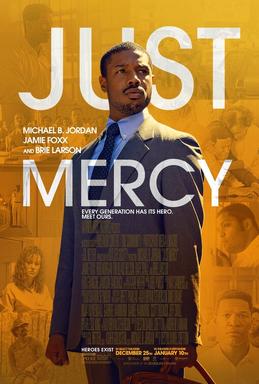Just Mercy emphasizes social justice, enumerating the variety of flaws of a criminal justice system blinded by racism and handicapped by poverty. Just Mercy was directed by Destin Daniel Cretton in 2019, and stars Michael B. Jordan, Jamie Foxx, Rob Morgan, Tim Blake Nelson, Rafe Spall, Karan Kendrick, and Brie Larson. The basis of the film is Bryan Stevenson’s memoir of the same title, which chronicles his quest for justice and highlights his pleas for mercy. Both the film and the book expose the racial and economic inequalities that lead to differential treatment in the criminal justice system. The pursuit of social justice, challenging the unequal status quo, and maintaining hope are at the film’s core. The blame for injustice is largely placed on individuals through incompetent legal representation, police misconduct, and a biased judge rather than systemic racial and economic disparities. In addition to injustice, nature and family play a significant role in the film, underscoring traditional Christian values.
In Just Mercy, Bryan Stevenson, a devout Christian and graduate of both Eastern University and Harvard law school, sets out on a journey of hope to effect change in the justice system by focusing on the most disadvantaged individuals. Inspired by an internship at Harvard where he worked on death row cases, he moves from his family home in Delaware to Alabama. In a particularly moving scene, Bryan tells Henry Davis, who is on death row, that he will not be executed in the next year and Henry responds with tears in his eyes how wonderful the news is. They bond over church choir and growing up poor. Henry is then forced back to his cell violently, but instead of anger or sorrow, he sings an uplifting hymn.
In 1986 Rhonda Morrison, an eighteen year old, is shot to death at her place of work. But she is not the only victim. The majority of the film centers around her wrongfully convicted killer, Walter McMillian. Walter McMillian’s story begins in the dense trees of a forest where a few men are cutting down a tree in Monroe County, Alabama. The audience hears the harsh loud sounds of the chainsaw and the tree falls. Walter looks up to the sky to see the sun streaming through the space he created in the forest canopy. While on his way home, he is arrested and his life changes forever. The police officer, who clearly knows McMillian (a.k.a. Johnny D) and his sexual escapades with white women, taunts him, telling Johnny D to run and indicating he would “be happy to get this over with.” Later nature contrasts with the very unnatural situation individuals like Walter McMillian find themselves in once they are behind prison bars. His arrest arises from bigotry and procedural injustices that are revealed as the film progresses.
Although Walter McMillian’s case dominates the film, other cases are briefly displayed, which help to more accurately represent an attorney’s workload and Bryan Stevenson’s legacy. As a film with a moral to the story, it is best to have one narrative in which the audience becomes invested so the depth and quantity of the failings of the criminal justice system are exposed. However, the other brief narratives also serve other purposes—to highlight different outcomes, demonstrate the variety of cases of injustice and prejudice, and further emphasize the extent of change needed. For example, through Herbert Lee Richardson’s case, the audience sympathizes with someone who has committed a violent crime. Richardson is a repentant veteran who suffers from mental illness, an issue that had not been brought up in his criminal trial.
Further, the critique of the system does not just indict the court process and court actors, but also the police, depicting racism and police misconduct. Through Bryan Stevenson’s eyes, the viewer experiences the distrust of the police and racial bias within the criminal justice system. The police clearly violate the law repeatedly, including arresting a young African American male for perjury because he made a statement that contradicted an aspect of a prior conviction. As part of the investigation, individuals are brought to death row, in stark violation of the law. Even African American lawyers are not immune to police misconduct. Bryan himself is stopped and harassed by police without any reason given and is also mistreated by a correctional officer.
While the criminal justice system can tear people apart, families support and guide each other. Henry McMillian’s wife stands by his side and professes his innocence despite Henry’s infidelity. Additionally, only after Bryan Stevenson visits his family does Henry agree to allow him to work on his case. Another break in the case involves the key witness, Ralph Meyers, who lied in the initial case. Once Ralph discovers the man he helped convict had kids, he tells the truth. Another example of the influence of family involves the prosecutor. As he and his family watch the airing of the McMillian story, she gives him a look of disgust after hearing him express his continued support of Henry’s conviction. Thus, the stability and significance of family offsets some of the chaos the criminal justice system creates.
Overall, the film is largely true to the book, especially in keeping with the main themes, but it does take some artistic license bringing the narrative to life. Through amazing cinematography and evocative music, Destin Daniel Cretton depicts a struggle for justice that is both frustrating, and rewarding. The structure of the film keeps the audience interested and aware that the film is based on a true story. A rather unique aspect to the film is that three individuals on whose appeals Bryan Stevenson worked are interviewed in the film. They briefly tell their stories to the camera and each one describes issues with their initial trial attorneys. Just before the credits, after the McMillian cases finishes with the civil trial, there is actual footage of Bryan Stevenson at Ray Hinton’s release from death row. This serves as a reminder that this is not a fictional story, but an account based on the harsh realities of a cruel system that has different rules based on skin pigmentation and money.
The editing, casting, acting, and sound all add to the drama and suspense. The editing is well done, allowing for a good deal of the story to be told visually. The casting is stellar, as the acting is superb. Each character feels authentic. The imperfection of the individuals depicted enhances the realism, increasing their humanity and likability. The film recognizes that we are all sinners, which adds to our humanity. Bryan Stevenson notes, “each of us is more than the worst thing that we’ve ever done.” In addition, the film’s sound amplifies the dramatic element, guiding our emotions. The clank of the entire cellblock as someone is executed or ecstatically leaves the prison creates a loud and powerful emotive reaction. The music complements the serious nature of the narrative and ties in Christian themes. Numerous hymns underscore Christian values followed by Bryan Stevenson and his clients and pair well with the events of the film.
For anyone who is interested in the pursuit of justice, or who needs to be equally inspired and angered, this film is a must-see. It triggers a wide range of emotions. At times humor is used to diffuse the seriousness of the situation. At other times, the film evokes tears of joy, sadness, and frustration. Through the wins and losses, one point remains—so much more work needs to be done to improve the lives of Americans in our criminal justice system. As Bryan Stevenson points out in the film, “The opposite of poverty is justice… The character of our nation isn’t reflected in how we treat the rich and the privileged, but how we treat the poor, the disfavored, and condemned.” Perhaps if more people experience this film, change could happen and we could start viewing individuals who are convicted of crime as human beings and treat them accordingly, loving thy neighbor as God intended. After all, as Bryan Stevenson states, “We all need justice. We all need mercy. And perhaps, we all need some measure of unmerited grace.”
References
Cretton, D.D. (Director) (2019) Just Mercy [Film] Warner Brothers.


